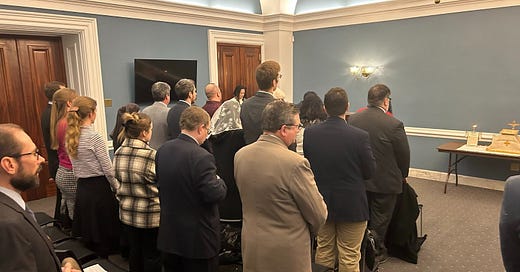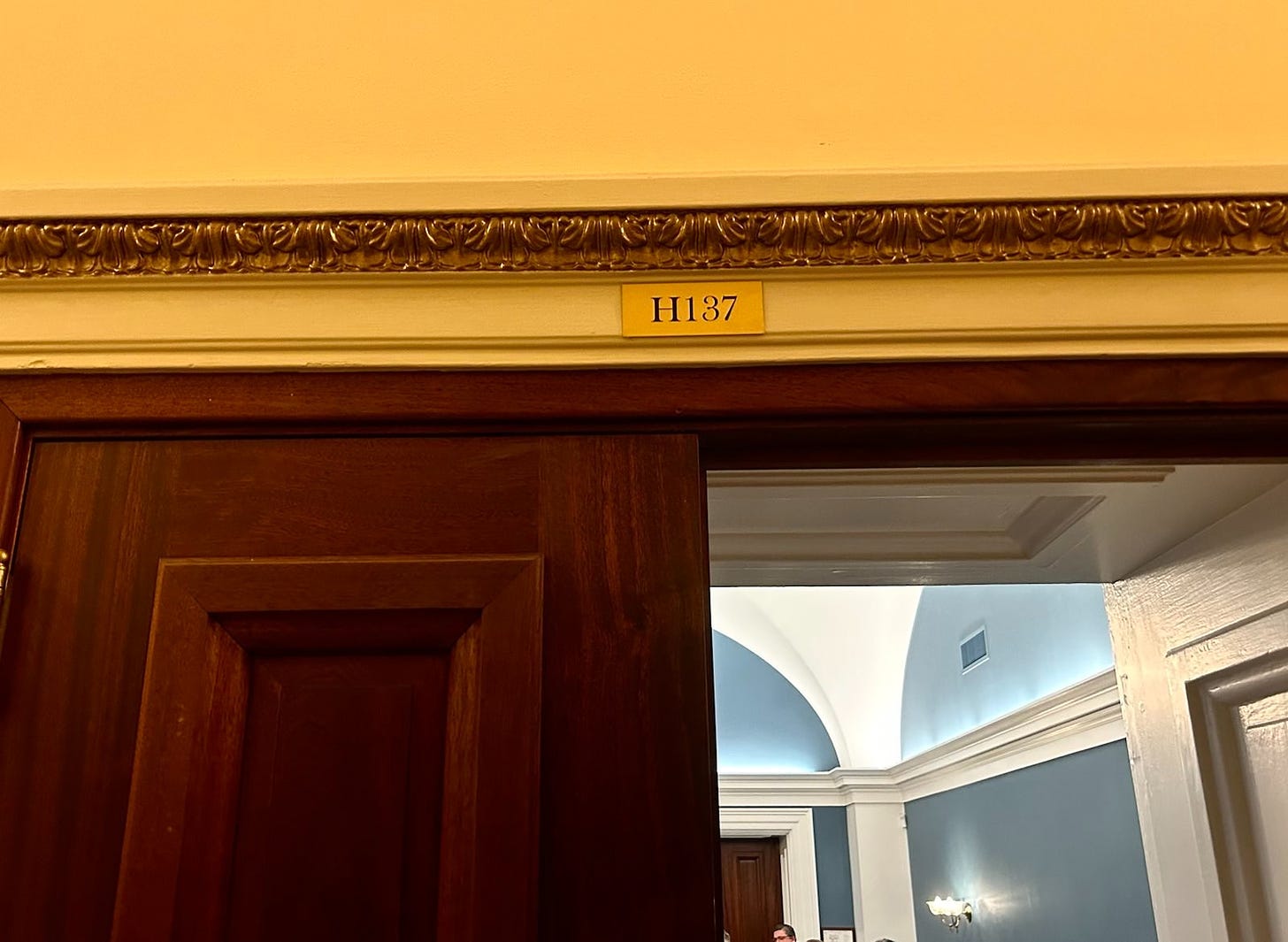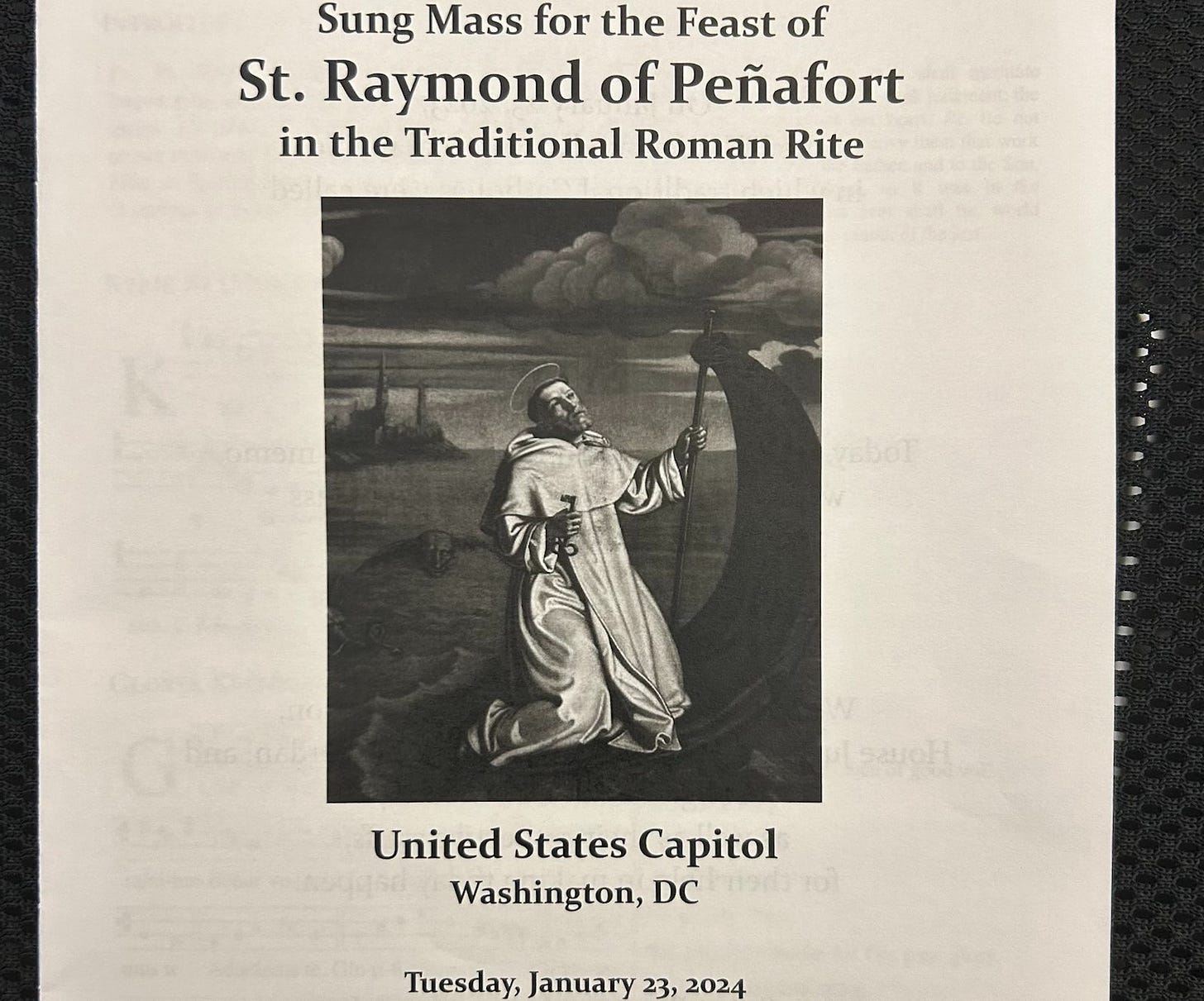
Capitol Latin Mass: ‘Traditional Catholics are not terrorists’
About 50 Catholics attended a Traditional Latin Mass in the U.S. Capitol Tuesday
Catholics gathered in room H-137 of the U.S. Capitol Tuesday, for a celebration of the Traditional Latin Mass, believed to be the first time the extraordinary form of the liturgy has been celebrated at the seat of the federal legislature.
The noon Mass, organized by the Arlington Latin Mass Society, was originally scheduled to take place in a different room, H-122, the private dining room of the Speaker of the House, but was moved shortly before the event began to accommodate the congregation.
According to organizers, the Mass was not approved by the Archdiocese of Washington, despite restrictions on liturgies celebrated with the preconciliar liturgical texts.
The congregation for the Mass numbered nearly 50 people, and ranged in age from a 1-year-old baby to Massgoers in their middle 60s. The attendees, which included both visitors to the Capitol as well as Congressional staffers, gathered to mark the one year anniversary of the FBI’s “Richmond memo.”
That memo, written Jan. 23, 2023, identified the supposed domestic security threat posed by “radical-traditionalist Catholics” and outlined a rationale for Federal law enforcement to develop sources and informants within Latin Mass communities.
After it leaked, the memo triggered considerable backlash among Catholics, with Virginia’s two bishops denouncing the text as “alarming,” “outrageous,” and “troubling and offensive to all communities of faith as well as to all Americans.”
The memo also kicked off a political storm, with the House Judiciary Committee and its Subcommittee on the Weaponization of Government holding hearings, and issuing a report which found that while the FBI’s director testified that the agency did “not categorize investigations as domestic terrorism based on the religious beliefs” of Catholics, “an FBI-wide memorandum originating from the FBI's Richmond Field Office did just that.”
Former committee member, now Speaker of the House Mike Johnson told The Pillar that the FBI’s answers to House oversight had not been satisfactory, and that the memo showed “viewpoint discrimination” by federal law enforcement.
Ryan Ellis, a board member of the Arlington Latin Mass Society and a lead organizer of Tuesday’s Mass, told The Pillar before Mass began that the liturgy was a “moment of pride” for Catholics attached to the extraordinary form of the liturgy.
“The idea came about as we were coming up to the one year anniversary of the FBI memo. It occurred to me that there's a great way to show that the House majority is behind the traditional Catholics that were being maligned by the FBI,” said Ellis.
“And what better way to show that than to have a traditional Latin Mass in the Capitol, which as best we can tell has either never happened before, at least going back to the Civil War.”
Asked what he hoped the Mass would achieve, beyond the spiritual edification of those attending, Ellis said “First of all, [I hope] this shows the FBI that traditional Catholics are not domestic terrorists.”
“We're not a threat to America in any way. We're Catholics. We're Catholics that maybe have a little particular idea of how you ought to do liturgy,” Ellis said. “But other than that, there's really not anything strange about us compared to mom-and-pop Catholics in any other setting.”
The FBI memo said the agency had seen “convergence” between so-called radical-traditionalist Catholics and the “far right white nationalist movement.”
“Illustrative of this has been the increasing collaboration of the far-right Catholic media outlet Church Militant (and its activist wing, the Resistance network) with the America First/'groyper' movement," the FBI memo said.
The Church Militant website has faced crises in recent months, with the November resignation amid scandal of high profile president Michael Voris, and a burgeoning financial crisis amid defamation litigation.
Beyond Church Militant, several controversial or fringe ecclesiastical figures have associated themselves with the Traditional Latin Mass, including former U.S. apostolic nuncio Archbishop Carlo Vigano and YouTube provocateur Taylor Marshall, who has accused Pope Francis of planning a “new world order.”
But Ellis said he doesn’t see an emphasis on extremist politics at the Latin Masses he attends.
“It’s not reflected by the reality of my experience at all with traditional Catholicism. People here are liturgy nerds. They're not racists. They're generally not even political.”
“These are people who want to raise their kids in the traditional form of the sacraments and the Mass. They want to have convenient access to the traditional form of the sacraments and the Mass full stop,” he said. “There's no political agenda, there's no agenda of any kind outside of that.”
Away from issues of secular government, convenient access to the traditional form of the liturgy is a charged issue in the Catholic Church, after Pope Francis’ 2021 promulgation of Traditionis custodes.
The motu proprio reversed previous papal policy, which had granted wide latitude for Catholics to request the extraordinary form of the liturgy and set the expectation that priests and bishops respond favorably to it.
Traditionis custodes instead banned the extraordinary form from being celebrated regularly in parish churches, and placed restrictions on diocesan bishops’ authority to authorize priests to offer the traditional form of the Mass.
The text tasks local diocesan bishops “to designate one or more locations where the faithful adherents of these groups may gather for the eucharistic celebration.”
In the Archdiocese of Washington, several previously stable or thriving extraordinary form communities were ordered from their parishes, with the extraordinary form now permitted in three Catholic spaces in the archdiocese, including a Franciscan monastery in the city.
At a December lecture held at Washington’s Catholic University of America, Cardinal Wilton Gregory was asked how to respond to students who might request the TLM on campus.
The cardinal responded that “Tradition dies a slow death, sometimes a bloody death.”
“[Pope] Francis is trying to make [his new norms] the official response to the Second Vatican Council's Sacrosanctum Concilium. It's not forbidden, but [the extraordinary form] is limited,” said Gregory.
The cardinal went on to blame priests for promoting the traditional liturgy, instead of lay Catholics expressing a sincere preference of their own.
“All of a sudden [a priest has] created the need in places where there wasn't a need there,” Gregory said. “So I think that the Holy Father is right to say: deal with the priests.”
The cardinal’s perspective seemed well known to the organizers of Tuesday’s Mass.
Ellis told The Pillar that the archdiocese was not given advance notice of the Jan. 24 event, and that the Arlington Latin Mass Society had not sought permission for the liturgy to be organized, despite the restrictions of Traditionis custodes.
And while attendance at the Mass was not limited to invited guests, Ellis said that efforts were made to limit promotion of the liturgy before it was celebrated.
“We've had to be a little discreet because of the dynamics of Traditionis,” Ellis told The Pillar on Tuesday, “but we had let trusted [congressional] staff know, and the closer we got to the event, the more we've kind of let the cat out of the bag with staff.”
“We put the word out as best we could without letting the cat out of the bag,” he said.
“The concern was that Cardinal Gregory calls the Speaker's office and cancels the thing on us.”
Organizers’ concerns about the possibility of ecclesiastical consequences were evident at the Mass.
Before Mass began, attendees were reminded that photography during the liturgy was not permitted, and that the priest celebrant should not be publicly identified — a condition to which The Pillar agreed when invited to attend the Mass.
The Pillar confirmed that the celebrant was a secular priest, in full communion with the Church, and in possession of full priestly faculties and celebret.
But the reminders were offered “for obvious reasons, given the current climate in the Church,” said the priest, who declined to speak to press or be identified.
Asked if organizers had considered requesting permission for the singular celebration of the TLM in the Capitol, given the national significance of the building to Catholic Americans from outside the archdiocese, Ellis said he “would make a broader argument that the Mass doesn't belong to [Cardinal Gregory] or to anybody else. It belongs to the people of God. It belongs to the Church. It's not meant to be regulated out of existence.”
“We want to be able to have the freedom to practice our religion freely. And that means free from the state. It also means free from meddling clergy, if you want to call it that.”
The Pillar requested comment on the event, and its liceity, from the Archdiocese of Washington. After publication, an archdiocesan spokesperson told The Pillar that “The Archdiocese of Washington was not asked for permission to hold a Traditional Latin Mass (TLM) outside of the three designated Archdiocese of Washington churches where this Mass is regularly celebrated, in keeping with Pope Francis’s guidance in Traditionis Custodes.”
A statement from the archdiocese also noted that details of approved venues and scheduled times for extraordinary form liturgies are availible on the archdiocesan website.
For his part, Ellis told The Pillar that recent restrictions on local extraordinary form Massgoers have been difficult to absorb for many, and felt at times like a politicization of the liturgy.
“I do find myself a lot of times treating it as if it's a political event more than if it's a spiritual event,” Ellis conceded. “Everything going on in the Church right now, with the sense that there's ‘political enemies’ and ‘political allies,’ and I don't remember it being that way before.”
“Now you sort of feel like you're in kind of a fight for survival. So it's a challenge. Absolutely,” said Ellis. “It's a challenge to your prayer life to be sure.”















Another reminder, since it appears to be sadly necessary, that the only real expectation we have for our comments is that everyone express themselves and address each other within the bounds of Christian charity.
“We want to be able to have the freedom to practice our religion freely. And that means free from the state. It also means free from meddling clergy, if you want to call it that.”
I sympathize with those who attend the TLM and I think that traditionis custodes is abhorrent but the sentiments expressed in this quote are disturbingly Protestant